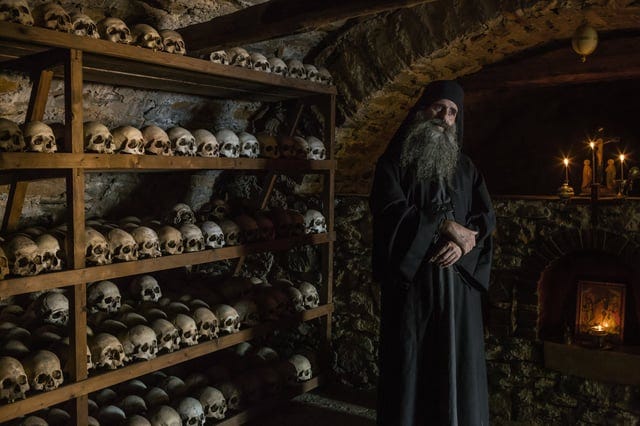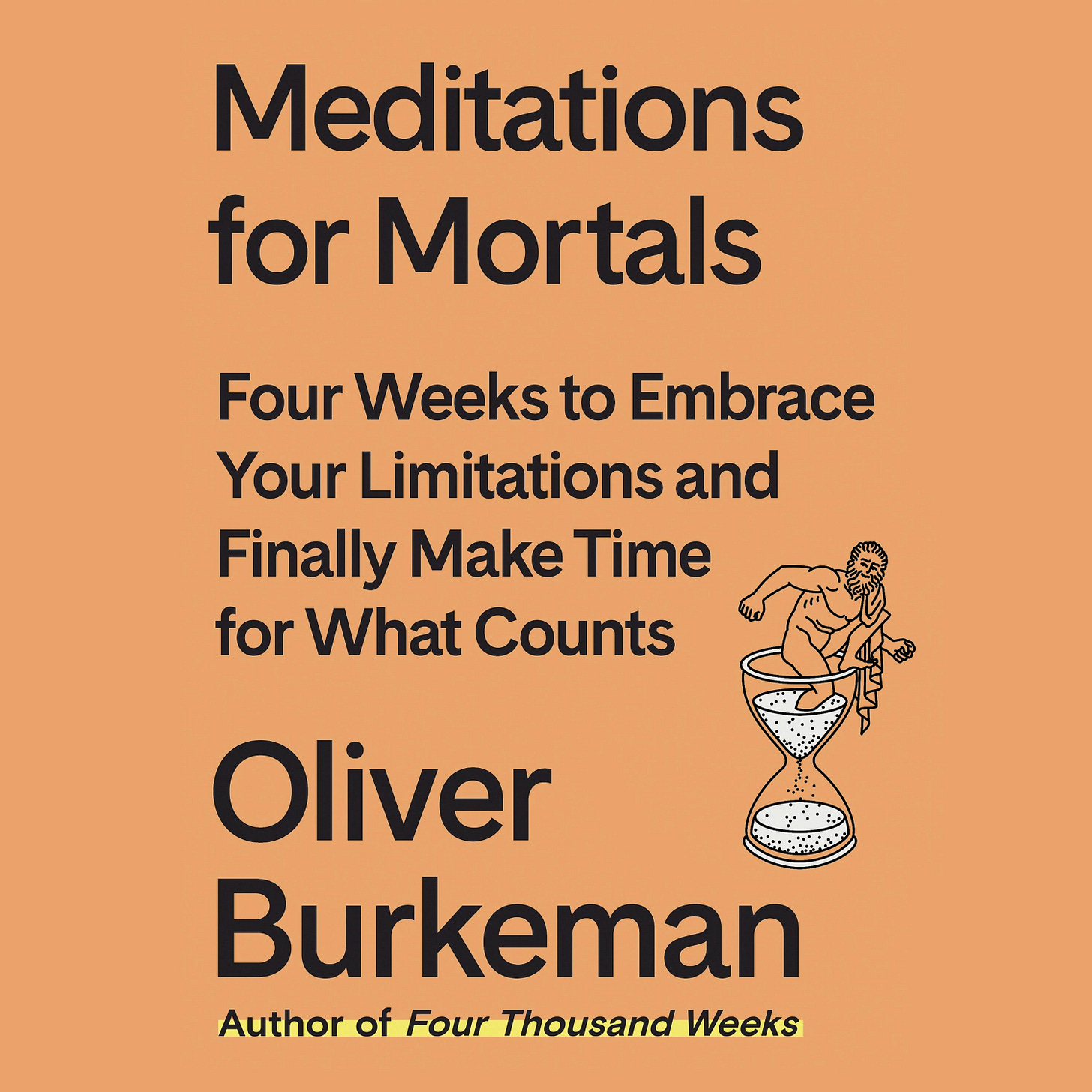Busyness is a Spiritual Issue
And Memento Mori Isn’t Enough

Scott Derrickson directed Marvel’s blockbuster Dr. Strange followed by the indie horror film The Black Phone. He ran into the exact same problem with both movies: not enough money, not enough time. The point being, no matter the budget or scale of a movie, there’s something human that craves just a little more control than is possible. We all want just a little more money than we have and are just a little more busy than we’d like.
C.S. Lewis famously said, “If I find in myself a desire which no experience in this world can satisfy, the most probable explanation is that I was made for another world.” Oliver Burkeman’s new book Meditations for Mortals is a four-week daily reading plan that tries (but ultimately fails) to assuage our desire to transcend our finite, human limits.
Burkeman’s approach is about acknowledging reality and unburdening yourself of unrealistic expectations. We will all die, we don’t have unlimited time (or attention), and that means making hard decisions and real sacrifices. For a certain type of conscientious, neurotic reader—the kind of person who finds himself inexorably drawn to self-help books (even after continual promises that this is the last one)—Burkeman nails the diagnosis.
His solution is less satisfying. Basically it’s “Yes, you really can’t do all that you’d like to, you are finite, and it sucks, but if you just face facts, it’s more bearable.” As to why we struggle to accept this human limitation, Burkeman is quiet. He merely names the problems and offers some limited tactics. Work on something important now, even if just for fifteen minutes. Don’t defer enjoying your life indefinitely. View your to-do list as a menu and pick what stands out to you. Maybe your computer files can stay disorganized and life will go on.
It’s fine as far as it goes, but another recent release, You Are Mine by Sister Anastasia, comes at this same problem from a radically different perspective, that of a millennial occultist-turned-Orthodox-nun. Both see the hyper-stimulation of modern life as incompatible with human nature. In Burkeman’s case, he sees this on purely material terms—attention span, our nervous system, the pace and precarity of Late Capitalism in the West. Meanwhile, Sr. Anastasia sees our chasing after ideology and stimulation as a misplaced desire, one that can only find satisfaction in Jesus Christ.
If our busy, anxious lives are a sign of spiritual, not merely cultural, malaise, then the solution must be deeper than a new lens on our to-do lists.
Although many of us have never dabbled in the occult, Sr. Anastasia likened the ubiquitous pull of digital technology to the appeal of evil spirits: “The structure of social media in my life was like a carbon copy of the ego bolstering, sensory simulation of the spirit world.” Both made her feel powerful and important. Not only that, she found her restless activity—“too much sugar, YouTube, and mindless website scrolling”—was taking her focus off Christ, “who was to be met in the space between things, [unlike] the prince of the world, who was constantly trying to fill those delicate spaces with distractions.”
I spoke with her a few weeks ago and asked her to expand on this idea that our distracted, stimulation-seeking behavior is a spiritual issue:
[Before] the fall, we were in a situation where we were being not stimulated but energized by the Divine energy of God in this unbroken flow. And it was only good. And when that fissure took place, and the separation occurred, that need, which is part of our structure, didn't just disappear. It's just that it is malfunctioning.
So that desire for stimulation, I feel this is something that's not just generational. It's something that's primordial, but because of what happened, we didn't then fill ourselves, [we weren’t] energized by that divine energy, but rather by all different kinds of other energies, so there's that element where it's just a new way of fulfilling an old need, an old lapsed fallen need. And if we think about it in those terms, then there's no way that you could then say that it doesn't impact your spiritual life, because if that need is supposed to be filled by God, and you're filling [it] with something other than God, then you're using a created substitute.
While it’s a cliché at this point to talk about the “God-shaped hole” in our hearts, I found Sr. Anastasia’s distinction of Divine energy vs. worldly stimulation helpful. And it points toward an oblique solution to the problems Burkeman so skillfully articulates. If we find ourselves harried by all that we leave undone, how little time we have, our inability to be perfect as we’d hoped, one answer is to say, “That’s life.” To Burkeman, his “almost complete lack of importance” in the grand scheme of things is cause for relief. None of it really matters.
But we seem to struggle mightily to accept that, to just let go, rational as it all sounds.
Alternatively, we can look at our hunger for more—more money, more activity, more accomplishments—as a desperate avoidance of our spiritual poverty, of our disconnection from the Divine energy. Here’s Sr. Anastasia again on how good activities—work, scholarship, friendship—can become unhealthy dependencies:
He wants to get into the parts of you that need that stimulation that is not Him, because those parts of you are not healthy. And so even if the thing on top is relatively fine, it's still blocking Him from doing that work. It's blocking the Holy Spirit from entering that part of you and purifying it and changing it…It paralyzes the process.
There’s something that feels unavoidably spiritual about a daily reader like Meditations for Mortals. Of course, it’s part of a broader genre—The Daily Stoic, The Daily Pressfield, The Daily Laws—popular authors repackaging their content as a morning devotional. In his case, he’s offering a four-week program to ease the reader out of denial about life’s brevity and imperfection.
At root, there’s a simple question: Why can’t we accept our limits? Is it merely an evolutionary maladaptation to modern life? After eons of boredom and scarcity we can’t help but chase after shiny objects and opportunities? The old “paleolithic emotions amidst the god-like technologies?”
If so, memento mori is the best you can offer and practiced acceptance the best you can hope for.
But, if our problems with our finitude are symptoms of our fallen state rather than biological flaws, then spending 4 weeks dwelling on our finitude won’t solve them. If the problem is primordial, the solution cannot be merely a hack or reframe.
Instead, we’d need to relinquish control not to the impassive universe but to its Lord. We wouldn’t scoff at our desire for activity, we’d direct it to its proper place. We’d stay in the present so that we might see God, not to avoid the anxieties of all possible future outcomes. We would focus on God and thereby feel small but not insignificant.
In other words, memento mori, sure, but remember St. Athanasius’ words as well, “God became man that man might become God.” Go ahead: try to make your habits not daily but “daily-ish,” keep a “done” (rather than to-do) list, and stop delaying and “just do the thing.” That’s all well and good.
But don’t forget to pray.




I have been writing and rewriting books of deep prayers. Every time when I set out to do this work I am confronted by, harassed by, distracted by the world, the flesh, and the devil. Why? The world and the devil loose there influence over me if I become holy. The flesh, my fallen nature dies, ceases to exist, is obliterated as light obliterates darkness. My fallen nature has the most to lose if I pray deeply and commune with God.
Wow! Fascinating to juxtapose those two authors. Very thought provoking!